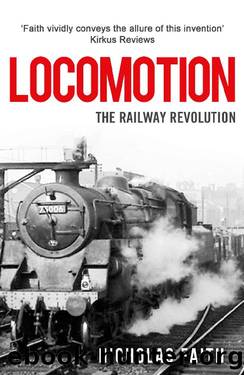Locomotion: The Railway Revolution by Nicholas Faith

Author:Nicholas Faith [Faith, Nicholas]
Language: eng
Format: epub
Publisher: Endeavour Press
Published: 2017-04-24T07:00:00+00:00
7 Steam and Society
From the outset railways were thought of as progressive, democratizing institutions. The feeling was natural, since they carried rich and poor alike. In the stirring words of a speaker at the Internal Improvements convention held in New York in 1836: The railroad is the poor manâs road. It is the rich manâs money expended for the benefit of himself and the poor man.â
The feeling was summed up in the words of Dr Thomas Arnold when he saw a train passing Rugby School. He was overjoyed âto see it and think that feudality is gone for ever. It is so great a blessing to think that any one evil is really extinct.â Ironically his sentiments were echoed by the reactionary Emperor Francis II of Austria who opposed the development of railways within his empire because they would bring in democratizing influences, what he described as ârebellionâ. In the event his successors found that railwaysâ subversive influence was less important than their usefulness in helping to bind together their dominions, and as we saw in Chapter 4, in controlling them through facilitating troop movements. Politically, in other words, they were neutral.
Socially they were more effective, though railways could not by themselves reform societies or break the habits of centuries. The effects were patchy and varied from country to country. One simple but obvious example is the provision of railway services on the Sabbath. In the United States the railroads were powerful enough to impose their Sabbathbreaking will on small towns. The railroad at Galesburg, wrote Ernest Almo Calkins, in They Broke the Prairie in 1937, âwas no longer a neighborhood enterprise, controlled by the little group of pious men who had founded Galesburg to be a Christian town after their own ideal.â
In Britain rail services helped to erode the rigours of the traditional Protestant British Sabbath â even though the Victorian Sunday coexisted with them. British railways have always had special timetables for Sundays, offering services which are invariably less fast and frequent than those of weekdays, whereas in continental Europe timetables are virtually the same throughout the week.
The Victorian era is generally thought of as a time of feminine enslavement, but contemporaries believed that the railways had greatly helped to free women. In 1844 an eminently respectable periodical, the Quarterly Review, noted with approval how the railways had brought about a change: âthe emancipation of the fair sex, and particularly of the middle and higher classes, from the prohibition from travelling in public carriages, which with the majority was a prohibition from travelling at all.â This new-found freedom was extended by the fact that many compartments on trains were mixed (although railways provided ladies-only compartments until well after 1945).
Typical of the way railways could encourage natural social trends but fail to shake older-rooted habits was in education. For a generation or more railways were thought of as the highest and most challenging form of construction. In Russia cadet engineer officers deemed it a great honour to work on
Download
This site does not store any files on its server. We only index and link to content provided by other sites. Please contact the content providers to delete copyright contents if any and email us, we'll remove relevant links or contents immediately.
| Automotive | Engineering |
| Transportation |
Whiskies Galore by Ian Buxton(41997)
Introduction to Aircraft Design (Cambridge Aerospace Series) by John P. Fielding(33122)
Small Unmanned Fixed-wing Aircraft Design by Andrew J. Keane Andras Sobester James P. Scanlan & András Sóbester & James P. Scanlan(32796)
Craft Beer for the Homebrewer by Michael Agnew(18237)
Turbulence by E. J. Noyes(8041)
The Complete Stick Figure Physics Tutorials by Allen Sarah(7366)
The Thirst by Nesbo Jo(6935)
Kaplan MCAT General Chemistry Review by Kaplan(6930)
Bad Blood by John Carreyrou(6614)
Modelling of Convective Heat and Mass Transfer in Rotating Flows by Igor V. Shevchuk(6434)
Learning SQL by Alan Beaulieu(6282)
Weapons of Math Destruction by Cathy O'Neil(6268)
Man-made Catastrophes and Risk Information Concealment by Dmitry Chernov & Didier Sornette(6011)
Digital Minimalism by Cal Newport;(5751)
Life 3.0: Being Human in the Age of Artificial Intelligence by Tegmark Max(5551)
iGen by Jean M. Twenge(5409)
Secrets of Antigravity Propulsion: Tesla, UFOs, and Classified Aerospace Technology by Ph.D. Paul A. Laviolette(5369)
Design of Trajectory Optimization Approach for Space Maneuver Vehicle Skip Entry Problems by Runqi Chai & Al Savvaris & Antonios Tsourdos & Senchun Chai(5066)
Pale Blue Dot by Carl Sagan(4997)
